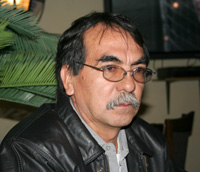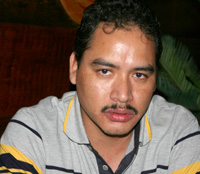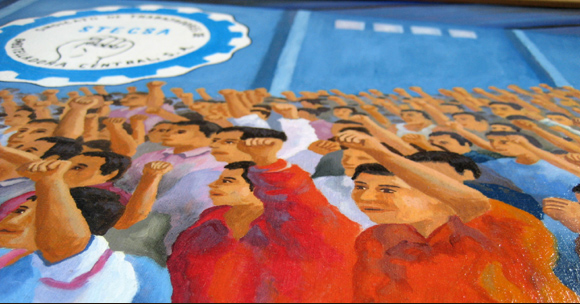|
|

|
Guatemala
 |
STECSA – Coca Cola
The union is the sum of us all |
|
Lázaro “Lacho” Antonio Serrano and
Carlos Alberto Luch, former organization
secretary and former general secretary,
respectively, of the Union of Workers of
Embotelladora Central Sociedad Anónima (STECSA),
leave their positions as members of the
union’s Executive Committee after
serving eight years. They leave after an
extremely dynamic period in the history
of the union, during which the plant
went from being a nationally-owned
business to being controlled by two
different transnational corporations,
with perhaps different attitudes, but
with one same strategy: undermining the
union.
-How many years have you been with
Coca-Cola, Carlos?
-This is my 15th year.
-And you, Lacho?
-I’ve been here 27 years.
-Yesterday, January 14, you both
stepped down from your positions in the
union’s Executive Committee. After your
eight years there, what is your
evaluation of that period?
Carlos
–We had to face a lot of changes. In
March 1998, Panamco (Panamerican
Beverages Inc.) acquired the
plant from Corporación Porras.
Later, in 2002, FEMSA (Fomento
Económico Mexicano S.A) purchased
Panamco, forming the largest
Coca-Cola bottling company
outside of the United States and
the leading one in Latin America.
Throughout this whole period, although
we saw many different faces and
characters in charge, in our opinion the
boss has always been the same. If we
look at the logs of claims presented by
one or the other transnational
corporation in 1998 and now by FEMSA,
there are no changes in its basic
strategy. Panamco may have been a
bit more aggressive, but the goal of
both has always been the same: to do
everything in their power to undermine
the union. In the face of this, as a
labor union, we have maintained the same
policy within the framework of the
collective bargaining agreement: never a
step backwards, always forward, even if
it means taking tiny steps.
That is the battle we’ve been waging
since ‘98, fighting off the attempts to
break, as we say, the backbone of our
collective agreement.
|

Lázaro “Lacho” Antonio
Serrano |
Lacho
-We, who have been heading the Committee
for eight years, have had serious
clashes with the business sector. We
have faced all of these situations from
a position built through the ample
support that workers have given us and
the trust they’ve shown in our work. The
rank-and-file members have corroborated
this in countless meetings and in each
election held in our union.
All in all, we think we’ve done a good
job, but we also think the organization
needs to breathe some fresh air, and
that’s why Carlos and I have
decided not to take part of the new
Executive Committee.
|
Nobody’s allowed to forget
“Nobody forgets and everyone learns that the
union was born when Guatemala smelt of
gunpowder, and the army and the paramilitary
groups were killing people like flies.
Nobody forgets, and the young learn, that
repressive forces murdered eight of our
union leaders and activists. Their pictures
and names are displayed in the factory’s
canteen and in the union’s headquarters,
which are also inside the plant. The union’s
anthem remembers them in its verses. Nobody
forgets and everyone learns how STECSA was
born.”
(Gerardo Iglesias) |
-But that won’t entail substantial
changes in STECSA’s strategy policy
…
Lacho –Naturally,
the committee’s political guidelines
are shaped by the entire union,
regardless of who is serving in the
Committee. And what are these
guidelines? Putting our greatest
efforts and dedication into
defending our rights and our
organization.
All these years of existence of
STECSA have left us with great
teachings. There were very difficult
times, with fellow unionists being
murdered, and others forced into
exile.
STECSA was forged amidst struggles,
and we are convinced that that
tradition will keep it alive.
-Does that explain STECSA’s
strength?
Lacho –We
see it as the result of two things:
the first is the Executive
Committee’s ongoing and effective
communication with the union’s
rank-and-file. Through that
communication we discuss all aspects
related with the collective
agreement, the status of
negotiations, the daily activities
conducted by STECSA, and the
challenges it faces.
Being frank with the rank-and-file
members and not losing touch with
them is a very significant aspect of
any organization.
The other pillar is our union
training activities.
We all participate in these
activities: from the union’s
earliest members to the newest
incorporations. With this mechanism
we can make everyone aware that just
as we have rights and enjoy certain
benefits gained through collective
bargaining, we also have to be
responsible for the union’s
day-to-day activities.
Another important element is
discipline. In STECSA, the “compa”
(or fellow unionist) that does not
participate in a general assembly,
or who fails to show up for the May
1st rally, or the October
20 demonstration that commemorates
the 1944 Revolution that overthrew
the Jorge Ubico dictatorship,
is penalized with the measures
stipulated in the union’s Bylaws. If
we enjoy rights and benefits thanks
to the union, then we also have the
obligation of participating actively
in the various activities organized
by it.
|

Carlos Alberto Luch |
Carlos –We
must be clearly aware that the
movement is not solely the work of
its leadership, or of any particular
leader, however brilliant that
leader may be.
There’s a movement only if the
union’s rank-and-file members become
aware of the importance of their
involvement and take action to
promote it. Our task as members of
the Executive Committee is to serve
as facilitators for securing the
commitment of the union’s ordinary
members, spreading among them the
idea that the union is the sum of
all its members.
The union is not the ten people in
the Executive Committee, it is all
of us.
-After a time as leaders, many are
reluctant to go back to the factory.
This, apparently, is not the case
with you two…
Carlos -In
my case, the sooner I go back, the
better. Why? Well, there are several
reasons, but mainly I want to get
back because I feel that there are
some things I’ll be able to observe
more clearly from there. I’m sure
that that perspective will be useful
to the union, and will also come in
handy if I ever become a member of
the Committee again.
-Lacho?
-The truth is that, in these 32
years of STECSA’s
existence, we have been the
longest-standing members of the
Committee. Other leaders were
elected and when their two years -a
term in the Committee- were up, they
returned to their jobs. These eight
years have been very positive, and
I’m not at all uncomfortable going
back to my job. And I feel
comfortable returning because of the
daily contact we’ve maintained with
the rank-and-file members….
Training as a tool
“When
a worker arrives at the factory for the
first time, the union welcomes him and
invites him to participate in the courses
that teach the history of our organization,
its struggles and goals; nobody can join
before they participate in these
activities.”
(David
Morales, general secretary of FESTRAS) |
-It is something that is evident when
you see how any worker can come into the
office where the Committee works, and
they sit down and talk openly, without
any problem, and the workers don’t feel
inferior to the union leaders, who in
turn don’t look down on them from a
higher position…
Lacho
–Which is something that management has
tried to do. If you recall, Gerardo,
during the negotiation with Panamco,
which lasted 23 months and ended in
2002, the transnational corporation
wanted the union to leave the plant,
claiming they needed the space for
storage purposes, and it tried to
convince us by offering to pay the rent
for a fancier place for our
headquarters…
Carlos
–They even offered us an entire floor in
a hotel
(laughter)…
Lacho –They
wanted us to hold our meetings in
conventions centers in some hotel or in
a theater. We know very well that our
greatest strength is in maintaining a
direct and permanent contact with our
rank-and-file members, and we’re not
going to give that up.
The office space we have for the
Executive Committee is very small, but
there is a warm atmosphere there; it’s a
place where we all feel equal.
-While the transnational corporations
bring in their “union models”, you know
full well that, from Rel-UITA, we seek
to socialize the way this union works
outside the country.
Carlos –I’d
say that STECSA is the thorn
stuck in Coca-Cola’s side since
the 1980s, when the agreement between
the IUF and the Coca-Cola
Company was signed. That represented
a milestone, because through the
international boycott and pressure we
were able to negotiate directly with the
transnational corporation’s parent
company. That is why when Coca-Cola
realized what it had done, it tried to
get STECSA out of the way.
STECSA also represents a bad example
in the eyes of any other transnational
corporation.
-Does the struggle continue for you?
Lacho –Something
we have been underlining throughout all
these years is that the same
responsibility you have when you’re in a
leadership position in the union, you
also have when you’re among the
rank-and-file.
The “compa” that says:
“I’ve done my duty for the union, now
it’s somebody else’s turn,” well, that
worker just didn’t get it, he didn’t
learn a thing!
-How would you define the way you feel
being a member of STECSA?
Carlos –I
joined the company when I was very
young, at 19. STECSA gave me what
nobody else had given me. My grandmother
used to say that you have to give in
order to receive, and, well, very soon l
realized that
STECSA gives you a lot, but at the same
time it needs a lot from you. With the
passing of time, I also became aware
that the union is all of us and that it
is everywhere.
Lacho –When
I started working in Coca-Cola,
during the hard times of 1979, we had at
the most 50 members and a strong
solidarista association that sought
to destroy the union. From that moment,
I began to understand that the union was
to a great extent my family. Today I am
grateful for all it’s given me. We’ve
had some difficult times, but we’ve also
had good moments, we can’t deny it.
I know that I’m only going to leave the
union when I’m dead and buried. As long
as I’m alive, I’m going to follow my
organization closely, I’m going to
continue fighting for STECSA.
|
 |
|
Gerardo Iglesias
Rel-UITA
January 15,
2008 |
 |
|
|
Photos: Gerardo
Iglesias
Volver
a Portada
|
UITA - Secretaría Regional
Latinoamericana - Montevideo - Uruguay
Wilson
Ferreira Aldunate 1229 / 201 - Tel. (598 2) 900 7473 - 902 1048 -
Fax 903 0905
|